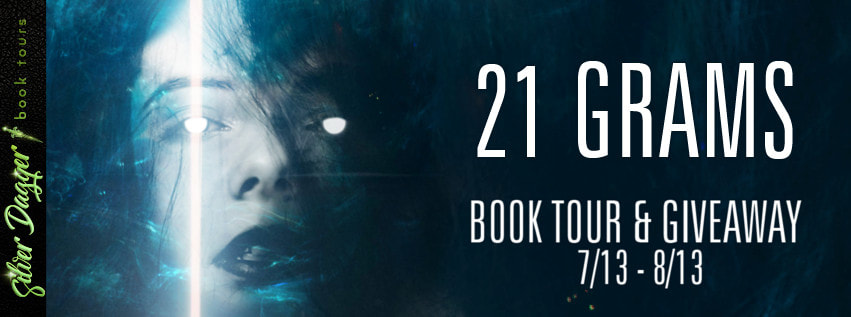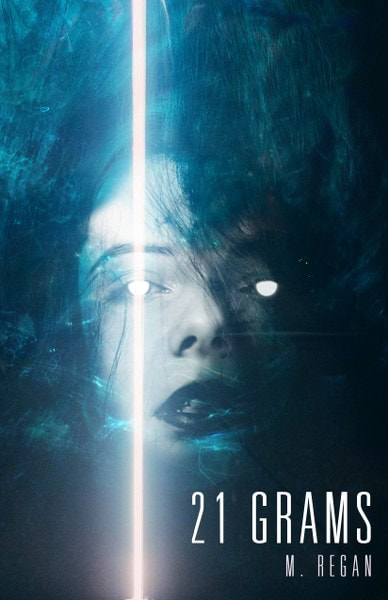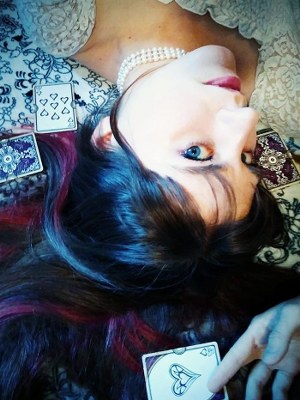21 Grams
by M. Regan
Genre: Horror
In the bowels of an unassuming, ever-moving funerary parlor, a mortician known as the Operator hides a fearsome machine called the Godwin, rumored to have the ability to resurrect the dead. It runs, like a soul does, on logos: on words. And in exchange for those words—for a client’s life story—the corpse of their choosing might yet walk again. Careful, though. Words bear weight, so one must choose them wisely. Author M. Regan delivers a harrowing and beautiful glimpse into a world filled with desire, darkness, love, and loss.
What are your top 10 favorite books?
1-4) The Bartimaeus Sequence by Jonathan Stroud
5-6) GOTH and Black Fairy Tale by Otuichi
7-9) Arc of a Scythe trilogy by Neil Shusterman
10) Good Omens by Neil Gaiman and Terry Pratchett
What book do you think everyone should read?
One of my friends has called it my “life’s mission” to make everyone I meet read The Bartimaeus Sequence by Jonathan Stroud, and she is not wrong. I consider it a crime against all that is literary that more people don’t love this series. It is hilarious. It is heartbreaking. It tackles big questions, and pulls no punches when it comes to delivering answers. Please— I am begging you to put aside Harry Potter and pick up this series, instead.
What kind of research do you do before you begin writing a book?
I tend to do most of my research mid-writing, to be honest. I’m usually not sure what information I need until I’ve run headlong into my own lack of knowledge, or have tripped in a hole that a fact ought to fill. It doesn’t help, either, that my memory’s not great. Even if I take notes—and I do! I swear!— I often forget details I’ve looked up unless they’re fresh in my mind.
Do you see writing as a career?
In terms of how seriously I take it, yes. But I’ve learned that it doesn’t take much for writing to go from “cathartic” to “an emotional drain.” For me, at least. Having a different occupation, one wholly disconnected from writing, gives me a chance to “fill my cup,” as it were. I also suspect that the stress of being financially dependent on selling stories would be detrimental to the quality of my work. So in that regard, no: I don’t see writing as my career. Nor do I want it to be. Not right now, anyway.
Do you read yourself? If so, what is your favorite genre?
I love dark fiction in all its iterations, but have a soft spot for the gothic. Themes of obsession, devotion, revenge— monstrous humans and humane monsters, with the shards of broken taboos scattered beneath their feet. Give me horrible things twisted into something beautiful.
Do you prefer to write in silence or with noise? Why?
Silence if possible, but since it’s usually not, the comforting white noise of RainyMoods. I need to be able to hear my own thoughts if I’m to get them down on paper.
Pen or typewriter or computer?
Computer, all day every day. I absolutely loathe writing long-hand (it hurts!), and I am embarrassingly dependent on spellcheck.
What made you want to become an author and do you feel it was the right decision?
I made my start, as it were, in fanfiction. This was years and years ago, when I was a young teen. Back then, I lived for the reviews I found in my inbox: messages from lovely people who said lovely things about how my work had made their day lovelier. I derived— and still derive— so much joy from the opportunity to entertain people.
Anyway, one day, when I was a slightly older teen, I received an exceptionally special review. It was in response to a story I’d posted about a character who had a chronic illness. Without going into too much detail, this reviewer shared with me that a friend of theirs had recently been diagnosed with the same illness, and that reading my fic helped and inspired their friend like nothing else had. I was a crying mess by the time I reached the end of that email. I saved a copy of it for years.
It was on that day it occurred to me that I could potentially reach more people— and thus, help more people— if I authored original work. Stories unburdened by the need of lore or prerequisite knowledge. So I tried. Tried without great success, granted, until I was in my twenties, but hey— we got there!
As for whether I made the right decision… I think so. Because for all that has changed about me and my writing, the one thing that hasn’t is my goal. My aim isn’t to become famous or to make millions: I just want to entertain people. I want to help make their day lovelier. I want to make them think, make them feel, make them see the world in a new way; I want to provide a needed moment of escape, or some small reason to smile. If I can do that for at least one person, then that’s enough to justify this path I’m on.
What advice would you give new authors?
Don’t take rejections personally. Whether you are a reader or a writer, the most wonderful and the most frustrating thing about creative writing is that it is subjective. There are works I consider masterpieces that I know other people despise, and books that are universally acclaimed that I absolutely do not understand the appeal of. And that’s okay. All of that is okay. Not every story is intended for everybody, and your work will inevitably fall into the hands of someone it is not right for— especially if you are actively submitting it to different places. Don’t let that get you down. Consider advice, make edits, keep going.
Oh— and get yourself a sticker chart, if you like stickers! I’ve got a “2021: 100 Rejections Challenge” sticker chart on my closet door. I’ve earned 52 stickers so far this year! Trying feels more like an accomplishment, I’ve found, when there are stickers involved.
Describe your writing style.
One of my friends recently called my style “avant garde,” which I appreciated. Usually, I just call it “purple.” Given the thematic nature of my work, I tend to lean more towards the flowery and the poetic. (Probably doesn’t help that I love finding and using antiquated adjectives.) I worry sometimes that people will think me pretentious because of this, but I promise I’m not. I’m a dork. And when not writing for professional purposes, a serial emoji-user. I want everything I say to be followed by a matte heart or a doodle of sparkles. In real life, too. That’d be brilliant.
What is your writing process? For instance, do you do an outline first? Do you do the chapters first?
It usually begins with an idea striking me at the most inopportune moment possible, such as when I’m trying to sleep or in the middle of work. I used to scribble these ideas down on scrap paper, but these days I’m more likely to be carrying my phone than a notepad, so usually I end up emailing myself. Later, when I have time, I’ll transfer that email to the bottom of a word document and write the story on top of it, deleting bits of my notes (or adding to them) as I go.
What are common traps for aspiring writers?
Listening to the wrong people. The internet is a loud place. Everyone on it has opinions. But not all of those opinions are created equally, or come from good, constructive sources. Take the time to learn who can (and should) be ignored. And remember, you’re never going to please everyone. Just try your best to be your best!
"The time has come," the Writer said, "To read of many things:
Of sheers and souls and sealing spells, of poisoned herbal tea."
M. Regan has been writing in various capacities for over a decade, with credits ranging from localization work to scholarly reviews, advice columns to short stories. Particularly fascinated by those fears and maladies personified by monsters, she enjoys composing dark fiction and studying supernatural creatures.
$20 Amazon
Join us for the #BookTour with Guest Post & #Giveaway
#21grams #horror #mregan










Comments
Post a Comment